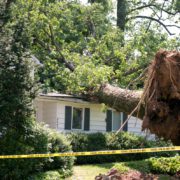Test Your Homeowners Insurance Knowledge

Think you know your stuff when it comes to homeowners insurance? See if you can answer these five questions. Knowing the facts can help you avoid costly errors and make better decisions when you’re looking for homeowners insurance quotes.
1. While flambéing dessert, you accidentally set the house on fire and it burned to the ground. Will your insurance pay to rebuild it?
If you’ve insure your home for at least 80% of its full replacement cost and the damage was caused by a covered peril such as fire, your homeowners policy should take care of the cost to fully repair or replace your home, less your deductible. Problems arise if you skimped on coverage and are underinsured. You may not have enough to replace a total loss in today’s market, and you could find yourself with an out-of-pocket loss for the difference. That’s why it’s important to review your homeowner’s policy at least once a year and adjust for changes in value.
2. An earthquake knocked your beautiful new 54” flat screen off the wall. Will your standard homeowners policy replace it?
Don’t even bother filing a claim. Standard, unendorsed homeowners coverage does not include earthquake damage. As we saw last year, earthquakes can happen anywhere, not just California. Purchasing a separate policy or adding an inexpensive earthquake endorsement to your policy is cheaper than buying a new TV.
3. After sending out 3,500 resumes and getting no response, you started a home business making cookies. One of your customers has an allergy to the peanuts that accidentally fell in the chocolate chip batter. She sues you for damages. Will your homeowners insurance take care of it?
Sorry, but that’s coming out of your pocket. Standard homeowners policies provide zip business or product liability coverage. If you’re operating a business out of your home, you’re fair game for a raft of liability risks. Depending on the nature of your business and your risk exposure, you should either consider a homeowners business endorsement or a separate business owners policy designed for small businesses.
4. Tough times have forced you to rent your finished basement to four college students. One of them bumps his head on an exposed pipe and sues you for his medical bills, pain and suffering and loss of class time that prevented him from taking his finals. Your homeowners policy covers it, right?
Wrong, big time! If you’d only rented to two students, you’d probably be covered. But standard homeowners insurance excludes coverage for injuries to in-home renters or boarders once their number exceeds two. You can either limit yourself to two renters or cancel your homeowners policy and buy a policy designed for commercial boarding houses (not cheap).
5. Unable to sell or rent your home in Ohio, you’re forced to leave it vacant while you take a job in North Dakota. While you’re away, a rainstorm causes a roof leak and thousands of dollars of water damage. Will your insurance company pay the claim?
Probably not. Most homeowners policies have a vacancy clause that suspends your coverage if your home is vacant or unoccupied for a specified period of time (typically 30 or 60 days, depending on policy). If you’re going to leave your home unoccupied for extended periods of time for any reason, check with your insurer ahead of time. You may be able to get a vacancy permit, although it will have more limited coverage that excludes some perils like vandalism, water damage or theft. For full coverage, you’d need the more expensive vacancy insurance, which isn’t offered by all insurers.

 EINSURANCE
EINSURANCE EINSURANCE
EINSURANCE EINSURANCE
EINSURANCE EINSURANCE
EINSURANCE EINSURANCE
EINSURANCE